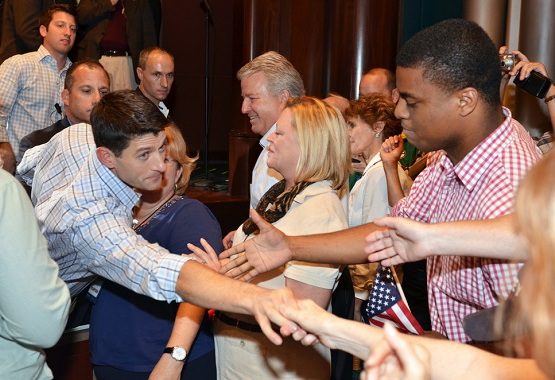CPAC Learns Why the Racial Learning Curve Breaks

Republicans who don’t want to be doomed by demographics were likely to be found at “Reaching Out: The Rest of the Story,” a panel discussion of strategies for engaging with non-traditional voting blocks at the 2014 Conservative Political Action Conference. In their consideration of model behavior and missteps, the panelists revealed how politicians’ fears and errors feed each other in a vicious circle.
When politicians head out of the “country clubs and rotary clubs” that Jason Roe, the panel’s moderator said that some of his colleagues were reluctant to leave, they’re moving from a place of strength to uncertainty. Ed Gillespie, a former chairman of the Republican National Committee, tried to correct a misapprehension that holds politicians and activists back from reaching out, “There’s a misconception that, in order to be on Univision you need to be able to speak Spanish, and that’s not true, you can have a translator.”
Relying on a translator is a humbling act. Barack Obama and the other attendees of Nelson Mandela’s funeral didn’t have the expertise to realize that the supposed ASL interpreter was, in fact, miming meaninglessly. That error was at least egregious enough to not be misinterpreted, but, when politicians need translation, they may end up being subtly misunderstood, so that damage is done without calling attention to itself or prompting a correction.
Attempts at self-reliance can be just as perilous as placing your trust in others. Michael Bloomberg’s attempts to use his elementary Spanish to connect with the people he served as mayor of New York City were treated as a running joke, even inspiring a parody twitter account (@ElBloombito) who was prone to utter Spanglish phrases like, “El nuevo mayoro shovelingo no es un big dealo. Yo use shovelos all el time! How else can yo buildo castles de sando at mi Bermuda beachcasa?”
And if this weren’t enough to scare politicians away from going beyond the cultures in which they’re fluent, they would have been truly disheartened if they had stopped by one of the panels later in the afternoon, “Opposition Research in the Age of the Grid” where Lloyd Miller of Directive Research was ready to how any momentary gaffe could be retrieved and exploited.
According to him, the greatest boon to opposition researchers has been the digitization of college newspapers, which let you peer back for any inapropos deed or utterance of a candidate (or anyone on their staff). He reminded the attendees not to forget to search for a target’s presence on legacy social media like MySpace and LiveJournal, and, when asked if he followed any reputational statute of limitations for missteps or had a kind of “age of reason” below which errors were irrelevant, he replied, “We don’t get to decide what’s relevant in campaigns, the voters do.”
So, for politicians whose cultural fluency is pidgin-like, reaching out to a neglected demographic publicly is a high-risk endeavor. This is the cause of the engagement gap that Robert Woodson, the President of the Center for Neighborhood Enterprise, analogized to invading a country with only naval and air support, and no actual boots on the ground. As it is, he said, the GOP is more often telling underserved groups that Republicans care about them than demonstrating it.
It takes immersion to become fluent in a foreign tongue, which is why Woodson took Paul Ryan on a tour of poor families and neighborhoods, to help inform his social policy work. Woodson contrasted this kind of embedding with the staged, ritualistic shows of solidarity that politicians are usually tempted towards, where a historic site or a diverse assortment of voters serves as a backdrop. These shows of respect can be motivated by pragmatism or genuine sentiment, but there’s a lot more to be learned by listening to living workers than by laying wreaths for dead civil rights leaders.
Woodson described his travels with Ryan as “a quiet listening tour.” But it would do Ryan and other politicians good if they had a little more room, once they’ve listened, to make mistakes and to learn. When people start speaking outside their own experience, they’re bound to make errors, sometimes even profoundly offensive or hurtful ones, but, as long as politicians feel duty bound to follow the adage “It is better to remain silent and be thought a fool than to talk and remove all doubt,” they are liable to remain foolish.
Errors of omission are less likely to attract the attention of opposition researchers than errors of commission, but both keep a politician from serving her constituents well.
Comments